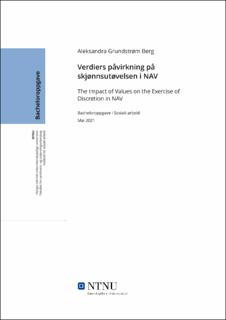| dc.contributor.advisor | Jørgensen, Kristina | |
| dc.contributor.author | Berg, Aleksandra Grundstrøm | |
| dc.date.accessioned | 2021-09-28T18:46:28Z | |
| dc.date.available | 2021-09-28T18:46:28Z | |
| dc.date.issued | 2021 | |
| dc.identifier | no.ntnu:inspera:79529603:34429180 | |
| dc.identifier.uri | https://hdl.handle.net/11250/2785710 | |
| dc.description.abstract | Sosialt arbeid er et verdibasert fag, noe som gjør at det kan være utfordrende å skille spørsmål om verdier fra de sosialfaglige spørsmålene. I denne oppgaven har jeg satt et søkelys på hvordan skjønnsutøvelsen til sosialarbeideren påvirkes av egne verdier ved tildeling og utmåling av økonomisk sosialhjelp i NAV. I tillegg har jeg sett på hvorfor dette er problematisk for kravene om likebehandling og rettssikkerhet. Metoden som ble benyttet for å svare på denne problemstillingen var systematiske litteratursøk i elektroniske databaser, samt kjedesøk.
Problemstillingen min har blitt drøftet opp mot relevant teori og forskning. Resultatene av dette viste at det skjer store forskjeller i tildeling og utmåling av økonomisk stønad i de ulike kommunene og NAV-kontorene i Norge. Enkelte studier konkluderer med at disse forskjellene skjer på grunn av påvirkning fra egne verdier, mens andre studier konkluderer med at dette skjer på grunn av forskjeller i kommunenes saksbehandlerpraksis. Uavhengig av grunnlaget tyder resultatene på at verdier er så grunnleggende i oss mennesker og for yrkesutøvelsen i sosialt arbeid at de med stor sannsynlighet alltid vil kunne påvirke skjønnsutøvelsen til sosialarbeideren. Dersom sosialarbeideren lar seg påvirke så mye av egne verdier i skjønnsutøvelsen at beslutningene blir vurdert som vilkårlige, er dette problematisk for kravet om at like tilfeller skal behandles likt. Dette gjør også at beslutningene regnes for å ikke være i samsvar med gjeldende lover og saksbehandlingsregler, og kan svekke tilliten til at sosialarbeideren har fattet «riktige» beslutninger på vegne av fellesskapet. | |
| dc.description.abstract | Social work is a value-based subject, which means that it can be challenging to separate questions about values from the social science questions. In this paper I have chosen to shed light on how the social workers’ exercise of discretion is affected by their own personal values when allocating and measuring social assistance in NAV. In addition, I have looked at why this is problematic for the requirements of equal treatment and protection of law. The method used to answer this problem is systematic literature searches in electronic databases, in addition to chain searches.
The problem has been discussed in light of relevant theory and research. The results showed that there are huge differences in the allocation and measurement of social assistance in the various municipalities and NAV offices in Norway. Some studies conclude that these differences occur due to influence from personal values, while other studies conclude that this occurs due to differences in the municipalities' caseworker practice. Regardless of the basis, the results indicate that values are such a fundamental part of the human nature and for the professional practice of social work, that they will very likely influence the social workers’ exercise of discretion in most cases. If the social workers allow their personal values to influence their exercise of discretion to the point where their decisions are considered arbitrary, this causes issues with the requirement of equal treatment. This might cause the decisions to be considered not in accordance with current laws and case processing rules, which might also weaken the confidence in whether the decisions of the social workers on behalf of the community are considered to be "correct". | |
| dc.language | nob | |
| dc.publisher | NTNU | |
| dc.title | Verdiers påvirkning på skjønnsutøvelsen i NAV | |
| dc.type | Bachelor thesis | |
